As seniors age, new stressors such as health concerns, isolation, and life transitions can contribute to anxiety.
At Cedarbrook of Northville, a luxury senior living community, residents have access to health and wellness amenities that help manage these stressors through physical, social, and emotional support. Detecting anxiety early can make a significant difference in managing symptoms and improving quality of life—so if you’re looking for a senior living community that can help you or a loved one celebrate life and enjoy every moment, schedule a tour with us today.
Physical Symptoms of Anxiety
Anxiety frequently manifests physically, presenting in ways that could be confused with other health conditions. Common physical signs include:
- Increased heart rate or palpitations – Feelings of panic or nervousness can cause the heart to race, which may be alarming for older adults.
- Muscle tension, restlessness, or fatigue – Anxiety often leads to physical discomfort, such as tight muscles or chronic tiredness.
- Sweating or trembling – Anxiety triggers the body’s fight-or-flight response, which may result in excessive sweating or shaking.
It’s important to note that these anxiety symptoms can overlap with the symptoms of other health conditions. Talk to a doctor if these symptoms persist.
Behavioral and Emotional Signs
Emotional or behavioral changes may also indicate anxiety. A senior may start withdrawing from social activities, avoiding hobbies, or expressing increased feelings of fear or worry. Behavioral signs to watch for include:
- Frequent worries about health or family – Persistent concerns about personal health or the well-being of loved ones can signal anxiety.
- Irritability or mood swings – Sudden changes in mood or irritability may be linked to anxiety.
- Avoidance of social gatherings – Avoiding social interaction could indicate that anxiety is affecting daily life.
- Trouble focusing or making decisions – Anxiety often impacts concentration and decision-making abilities.
Anxiety and Seasonal Affective Disorder (SAD)
For many older adults, anxiety can intensify during the fall and winter months. Seasonal affective disorder (SAD) is a form of depression linked to reduced daylight, and it can exacerbate symptoms of anxiety. Seniors who experience SAD may feel more fatigued and isolated, which can further contribute to anxiety.
Identifying the signs of both anxiety and SAD ensures the appropriate support and care can be provided. Increasing exposure to natural light and staying socially engaged are essential in managing these conditions.
Strategies for Managing Anxiety
Managing anxiety in older adults involves a combination of emotional support, physical activity, and healthy routines. These strategies can help reduce anxiety and improve overall well-being:
- Encourage regular physical activity – Exercise is one of the best ways to alleviate anxiety. Gentle activities like walking, swimming, or chair yoga promote relaxation and boost mood.
- Establish a daily routine – A consistent schedule with set times for meals, activities, and rest can help seniors feel more in control, reducing anxiety.
- Stay socially engaged – Socialization plays a key role in combating anxiety and isolation. Encourage regular visits with family and friends or participation in group activities. Communities like Cedarbrook of Northville offer social events that foster connection and help build friendships.
- Utilize relaxation techniques – Breathing exercises, meditation, or mindfulness practices can effectively calm the mind and reduce anxiety.
- Monitor diet and sleep – A balanced diet and sufficient sleep can contribute to better emotional health and help manage anxiety.
Identifying anxiety early can lead to better outcomes and help your loved one maintain emotional well-being.
Explore Support at Cedarbrook of Northville
Cedarbrook of Northville understands the unique challenges older adults face when dealing with anxiety and seasonal affective disorder. Our community offers compassionate care, health and wellness amenities, and resources to support mental health. Call 734.865.2765 or reach out online today to schedule a tour and learn how Cedarbrook can provide a supportive environment for your loved one.







